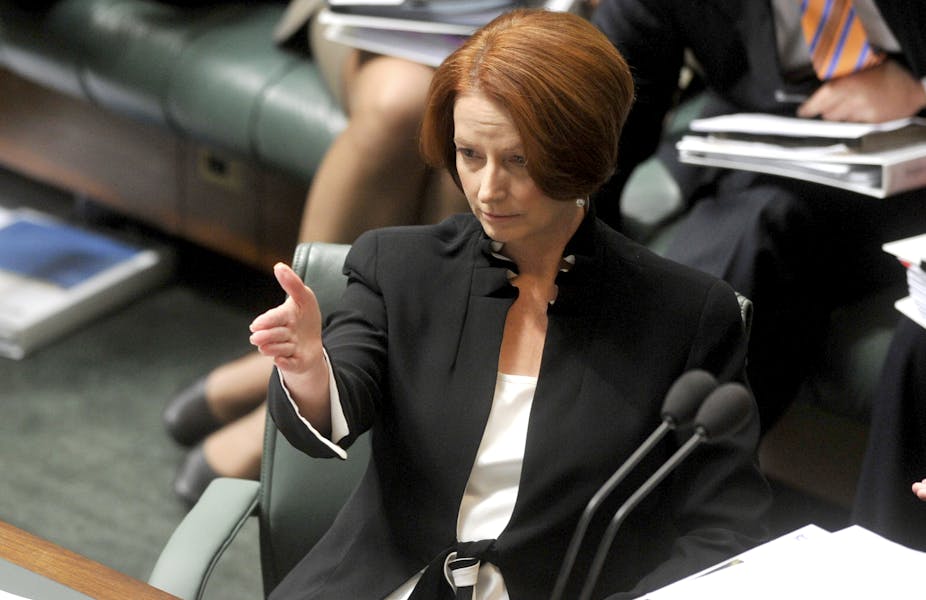Prime Minister Julia Gillard delivered one of her strongest messages to the mining sector last night, telling mining bosses at a Minerals Industry dinner in Canberra that they don’t own Australia’s minerals resources, the Australian people do. And what’s more they “deserve their share.”
The idea of “spreading the benefits of the boom” has been strongly countered by the Australian mining sector for some time. Their mantra is that they are too heavily and unfairly taxed.
This was argued again last night by Minerals Council president Peter Johnston who criticised the “endless dialogue about redistribution”.
BHP Billiton chairman Jacques Nasser also complained earlier this month that Australia’s industrial relations and tax systems would force his business offshore.
But the truth is the mining sector in Australia has been taxed lightly. As University of New England’s Christopher Lloyd points out we’ve known this since the Henry tax review, and have had it confirmed again in this year’s Budget papers (see figure below).

Looking at the history behind this debate, Loyd points to the collective social ownership felt by Australians, expressed through their parliaments, for material endowments like minerals, water and ecosystem services.
Political history, he contends, was built, in part, on the hegemony achieved by those who monopolised economic rents from exclusive access to these endowments. Some countries, like Australia, managed to “…transform its dependency [on commodities] into a wealthy, middle class, democratic, urban society from the early 20th Century.”
However, the governments of Australia suffer from a deficit of effective policy to capture the extraordinary commodity boom incomes being generated by the mineral mining companies. The consequence is that Australia is now near the bottom of OECD countries in its long-term provision of social and physical infrastructure.
But I would contest Loyd’s point that “the private sector lacks the capacity or is prevented from providing the shortfall.”
Rather than directing cash into the Mineral Resources Rent Tax I have suggested that iron ore giants BHP Billiton and Rio Tinto use their extraordinary profits to deliver endowments to Australian universities.
It’s not that they can’t or don’t already make contributions to public social and physical infrastructure. For example, most recently, Rio Tinto agreed to pay for a Professorial Chair in Geotechnical Engineering at the University of NSW and donated $3 million to the University of Western Australia (UWA) for engineering and mining related education. BHP Billiton Mitsubishi Alliance made a donation to the University of New South Wales of $2.7 million for two Professorial Chairs in mining-related research and education.
Both companies already donate about 1% of their profit to community development within the respective catchment zones of their mines around the world. Other notable donors from the mining industry include personal pledges from Clive Palmer of $100 million for medical research and Pilbara communities development, and commitment from Andrew Forrest to a program to employ 50,000 Indigenous people.
The Australian Government allocates about $10 billion per annum for universities’ operations. Higher Education is one of those sectors of social infrastructure that adds significantly to the well-being of all Australians, yet is horribly under-funded and subject to the dead hand of corporatist compliance management.
This situation does not augur well for our future lifestyle or livelihoods. There is, however, very good reason to think that the mining companies have the capacity to inject new life directly into this sector and should bow to the pressure of our collective Australian social expectations. They should divert/endow the equivalent of one year’s Federal budget allocation into higher education sector from their extra-ordinary profits from 2012 to 2020.

Not only do endowments mean that the cash as a capital base is secured, but the investment income can be put toward recurrent funding needs, like salaries, vastly improving the current parlous state of higher education in its capacity to respond to societal needs.
And of course, this investment should be given without strings attached. Universities know what and how to educate; this level of endowment will effect change across the many disciplines that make society whole, not advance narrow self-serving interests.
Such an investment would mean so much for the key people whose lives are affected by these social actors – the companies. For BHP Billiton and Rio Tinto employees – being identified with such a process would change how they thought of their roles, their employer, themselves as citizens, possibly enhancing retention and productivity for the companies. It might force a change in negotiations when the companies encounter other governments, unions, or even their key customers; it’s not all about the money.
Investing in higher education, without attaching strings, is in the companies’ medium to longer term benefit, as well as a benefit for rest of the myriad small to medium-sized businesses in Australia, who will, most likely, be the employers of the children of current mining company employees and of mining company shareholders.
But it the legacy of such transformational investment - of a mineral endowment to an educational endowment - that would be seen by Australians; A legacy that would represent the true, on-going value of the mining boom, working over generations, beyond the lifetime of any mine, that would satisfy our social expectations of the distribution of ‘profit’ from the exploitation of our common resources.
Investing in Australian higher education now, in the current maelstrom and uncertainty of our economic and social systems, by two of the largest companies in the world, would be a signifier of the need for an alternative to business and politics as usual.

